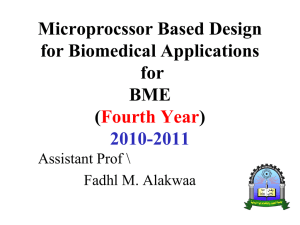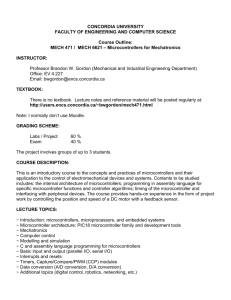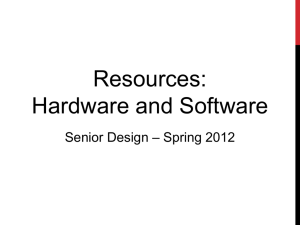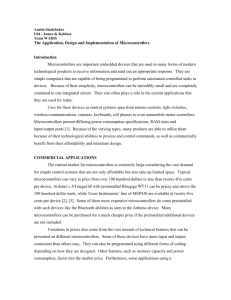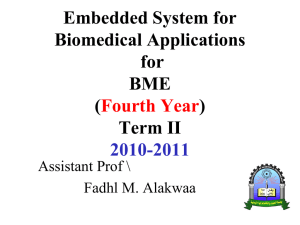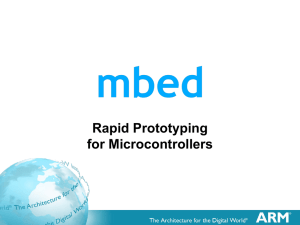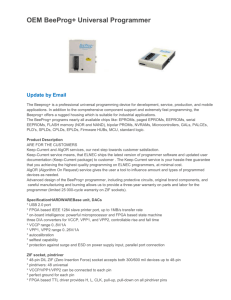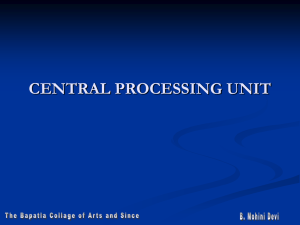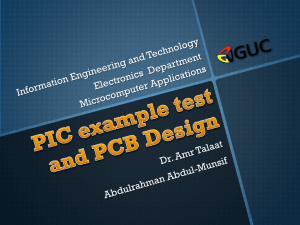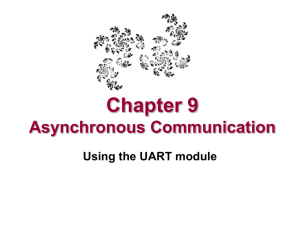File - Fadhl Alakwaa, PhD
advertisement
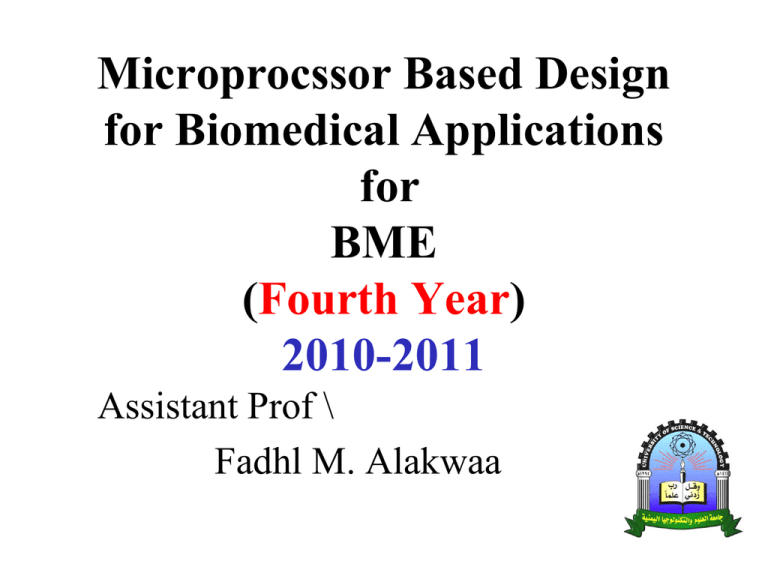
Microprocssor Based Design for Biomedical Applications for BME (Fourth Year) 2010-2011 Assistant Prof \ Fadhl M. Alakwaa Course Description: توصيف المقرر • This course covers theoretical and practical topics of the Microcontrollers, Microprocessor registers, memory, and programmable input/output devices. Also it covers the Interrupts, Single chip controllers, Design and testing of software for microcontrollers. It also demonstrates the hardware/software design tradeoffs and issues and the individual design projects. Purpose: الغاية (الهدف) من هذا المقرر • The purpose of this course is to design biomedical system using one of the new engineering tools (Microcontrollers, Microprocessors, DSP, FPGA,..). TOPICS COVERED: المواضيع المغطاة • Microprocess and embedded system • Microcontroller application in biomedical application • Concepts and usage of microcontrollers • Atmel microcontrollers + Tools • Breadboard – circuits, Soldering, SMD • Analog electronics ( OpAmps, Filtering ) • Sampling and A/D Conversion • Assembly & C-Programming, Kiel TOPICS COVERED: المواضيع المغطاة • Event-based firmware programming, interrupts • Data Transmission using UART/RS232 • Interfacing uC-firmware and PC (host-) software • Design of PCBs using a CAD-Tool • Usage of the Eagle-CAD Layout Editor • Soldering and building up electronic circuits TOPICS COVERED: المواضيع المغطاة • Reading datasheets, studying new parts • Understand the PowerPC processor architecture • Programming in assembly & C. • Understanding how assembly is converted to machine code • Do basic hardware and software debugging • Be able to work with, program, and design basic embedded systems STUDENT LEARNING OBJECTIVES أهداف المقرر • FIRST WHAT IS THE PROGRAM OUTCOMES: SEE THE PAPER INFRONT OF YOU. STUDENT LEARNING OBJECTIVES أهداف المقرر 1. Able to simulate experiments and acquire biological signal. (Program Outcome b). 2. Understand the design steps of the biomedical equipments. (Program Outcome c). 3. Understand the structure of the 8051 Microcontroller/the concepts and usage of microcontrollers. (Program Outcome c). 4. Able to define project scope, available solution, constrains and alternative solutions. (Program Outcome c). STUDENT LEARNING OBJECTIVES أهداف المقرر 5. Work with his group effectively to complete the project.(Program Outcome d) 6. Uses ethical conduct in communication (using citations, acknowledging sources of info). (Program Outcome f). 7. Conveys information effectively in written and oral presentations. (Program Outcome g). 8. Understand and appreciate the role of medical device in solving health care problems. (Program Outcome h). STUDENT LEARNING OBJECTIVES أهداف المقرر 9. Search pertinent, professional literature, use other information resources and evaluate how sources contribute to knowledge. (Program Outcome i) 10. Develop an understanding of the functionality capabilities of data acquisition system in the medical devices. (Program Outcome k). 11. Write programs in C and assembly. (Program Outcome k). STUDENT LEARNING OBJECTIVES أهداف المقرر 12. Do basic hardware and software debugging. (Program Outcome k). 13. Explore the use of Internet (Netscape) as an educational source in instrumentation. (Program Outcome k). Course/O utcomes a b c d e f g h i j k l m BME401 x M H H H L M H M H M x x Lab Exams+ Project Project Project Project report Project description Project Project report Project Project + Lab OUTCOMES COURSE MATRIX [ كيف يمكن للمقرر ]إن يخدم المخرجات األصلية للبرنامج Activity to achieve the outcome H : 50% contribution to the outcome. M: 25-50% contribution to the outcome. L: 10-25% contribution to the outcome. COURSE POLICIES سياسة حضور الفصل Class Attendance: حاالت التأخير Tardy: االمتحانات Exams السياسات المتبعة في حاالت الغياب عن االمتحان التكاليف والمشاريع Assignments & Projects: السياسات المتبعة في حاالت تأخير تسليم التكاليف والمشاريع ومتى يجب أن تسلم إلى األستاذ • The PROJECT is due on 01/03/2012. • • • • • • COURSE POLICIES • Exam Attendance/Punctuality: االنتظام وحضور االمتحان • توصيف السياسة المتبعة في حاالت تأخر الطالب عن االمتحان • Plagiarism: االنتحال • يحدد تعريف االنتحال وحاالته واإلجراءات المتبعة في .حالة حدوثه • Plagiarism is defined as “copying or stealing someone else’s words or ideas and claiming or presenting them as if they were your own.” GRADING SYSTEMنظام التقييم • • • • • Term Exam: 50 points Midterm Exam: 15 Points Lab: 15 Points Class Project: 15 Points Other (Homework assignments, quizzes, etc.): 5 points Project • Students will be organized into teams of four and each team selects a topic from a list of topics provided to students at the start of the semester. The team should share and distribute responsibility. Each team submits a technical report and prepares a class presentation. Making use of all resources, e.g., patents, journal publications, internet, labs, etc., is encouraged. Project Phasesمرا حل تنفيذ المشروع CLO مخرجات التعلم Scope &Focus مدى وبؤرة التركيز في كل مرحلة Due date موعد التسليم لكل مرحلة Phase 1 4,6 Kiel program Week 5 Phase 2 7, Proteus program Week 9 Phase 3 9,13 Hardware work Week 1416 Project Evaluation • Oral Presentation Grading: Criteria Points Organization 2 Clarity of presentation 2 Effectiveness 2 Technical Accuracy & grasp of the subject 2 Engineering versus biology content 2 Total 10 RESOURCES: المراجع • Text Book الكتاب األساسي للمقرر • The 8051 Microcontroller and Embedded Systems Using Assembly and C-2nd-ed BY Mazidi http://fadhl-alakwa.weebly.com/ Course Lab Course Lab Important comments from the previous course • Not Excuses • Not degree explanation (fair assessment) • In time policy (one day late=one degree loss) • Join a group (mandatory) • Update your attendance and results daily. Group Activity: BME_UST http://www.facebook.com/search/?q=BME_UST&init=quick#!/grou p.php?gid=325135515239&ref=search&sid=1096082202.17723631 20..1 Microcontrollers in embedded biomedical Applications Microcontrollers in embedded biomedical Applications: We want to have systems that : ● are reliable ● are small and lightweight ● have a low power consumption These issues are critical when we deal with body implants I: Introduction – Microcontrollers Some features / advantages of microcontrollers: ● ● ● ● ● they are small and flexible easy to use ( most of the time .. ) few external components and wires needed low and ultra low power designs possible (-> PSoC, ASIC ) wide range of different uCs available (memory, I/O, speed, busses, A/Ds ) ● data interchange using standard bus systems; -> various peripheral hardware accessible ● IDEs and toolchains for firmware programming / ● Simulation and high level languages -> 90% of the manufactured CPUs are not found in desktop PCs but in embedded systems, with growing areas of application: RFID, hidden "ubiquitous" computing, wearables, "smart environments", MEMS (micro electro-mechanical systems) I: Introduction – Microcontrollers Some examples for uC-based biomed devices / applications: ● various sensors or meters: Body temperature, Blood Pressure, Blood Sugar Level, … ● Implants and prostetics ● Pacer makers (for heart, breathing, ...) Adam blood glucose meter ● functional Electrostimulation ● Orthesis and artificial limbs ● Biosignal acquisition equipment www.heartratemonitor.co.uk I: Introduction – Microcontrollers Some examples for uC-based biomed devices / applications: ● portable emergency equipment (defibrillator, ..) ● Sports medicine ● Patient monitoring ● “Smart Homes", service robotics ● support of Communication for disabled persons ● wireless sensor networks / Body Area Network (BAN) ● Sensors and Actuators for stationary medical equipment Life-point defibrillator Spo2 Module Microcontroller In Research Pace Makers and Functional Electro-Stimulation http://www.hgcardio.com/HRhythm/Treatments/a_pacemaker_schematic.jpg ● current pacemakers have 5-7 yrs. battery lifetime ● feedback loops -> adapt to physical needs ● multichannel stimulation and measurement electrodes Parkinson relief from deep brain stimulation http://www.firstscience.com/SITE/IMAGES/ARTICLES/dbs/man_pacemaker.jpg http://www.parkinson-club-u40.de/Hirnschrittmacher.htm ● lack of dopanine in substantia nigra ● hyper-activity of nerve cells ● pacemaker „inactivates“ those cells Other Areas for FES - Implants / Pacer Makers http://www.bio-pro.de/imperia/md/content/bioregionen/freiburg/neuropro.jpg http://www.altenpflegeschueler.de/krankheiten/querschnittslaehmung.php Some examples: ● muscle activation / support ● gastrointestinal support ● breathing support ● chronic pain relief
